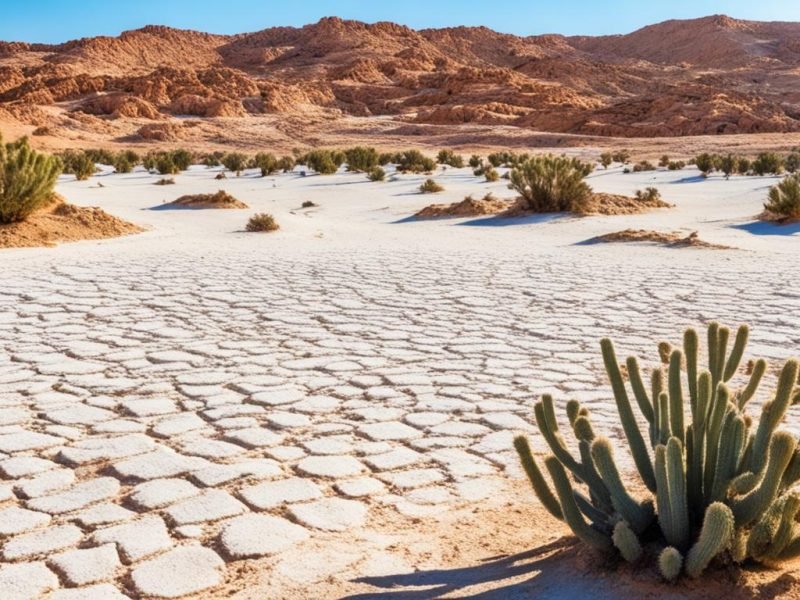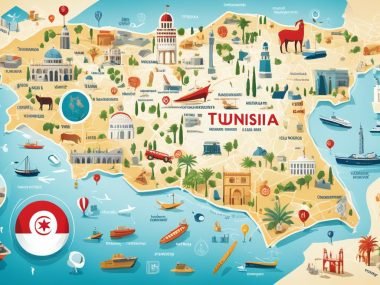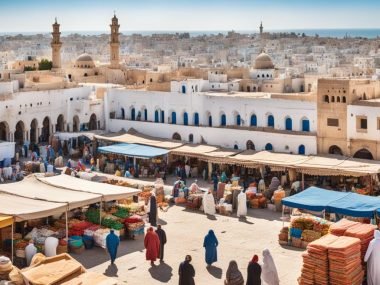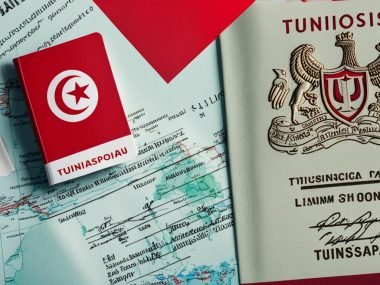Tunisia’s weather can really surprise its visitors, especially in winter. The northern coast and Tunis enjoy mild and rainy winters but have hot, sunny summers. As you move inland, the climate changes from semi-desert to full desert. Here, it rains less and gets hotter.
In winter, Tunisia’s days are around 18°C but nights can go down to about 11°C. This means you will need warm clothes. Impressively, Tunisia still gets a lot of sunshine even in deep winter. It’s a great place to be if you want to avoid really cold weather.
Key Takeaways
- Tunisia exhibits a varied climate, with the northern coast featuring a Mediterranean influence.
- Daytime winter temperatures in Tunisia average around 18°C, with evening lows near 11°C.
- Inland areas transition from semi-desert to desert climates, with significant temperature variations.
- Despite its location, Tunisia can experience cold evenings requiring warm clothing.
- Tunisia receives abundant sunshine even during winter months.
Overview of Tunisia’s Climate
Tunisia has a varied climate due to its location. Near the coast, places like Tunis have mild, wet winters and hot summers. This area gets most of its rain in late autumn and winter.
The further inland you go, the drier it gets. Here, the climate becomes semi-desert and then desert in the south. There’s less rain, and temperatures vary more sharply.
By the coast, sea breezes make the winters milder. But inland and desert areas get really hot in summer. They even experience sandstorms. These differences show Tunisia’s winter climate has many faces, from gentle to harsh.
| Region | Climate Type | Winter Characteristics |
|---|---|---|
| Northern Coast | Mediterranean climate | Mild and rainy |
| Inland | Semi-desert climate | Moderate to cold, lower rainfall |
| Southern Desert | Desert climate | Very cold nights, negligible rainfall |
Average Winter Temperatures in Tunisia
Exploring the winter climate in Tunisia is key. The capital, Tunis, is a good starting point for temperature data.
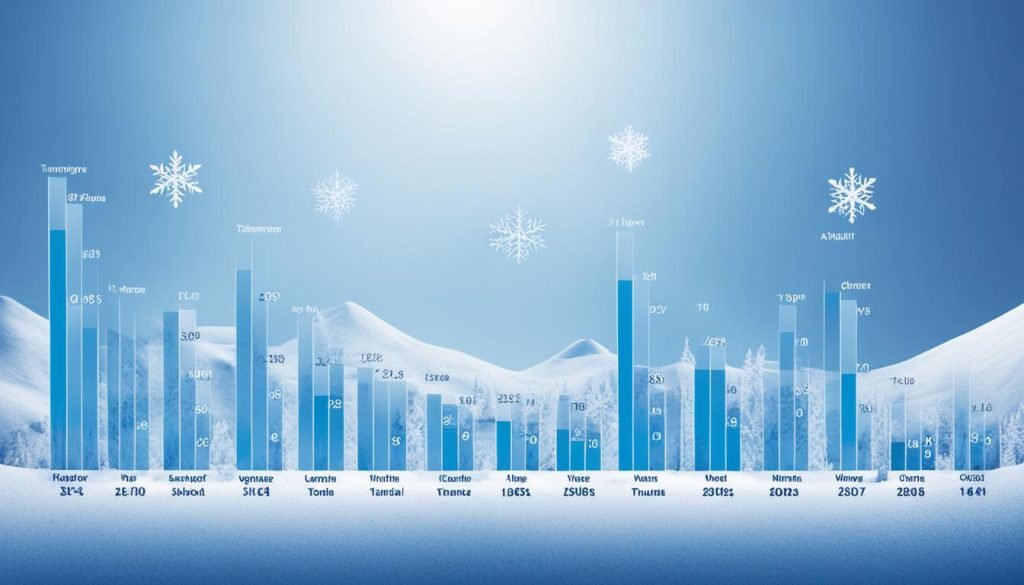
Typical Temperatures
In January, Tunis sees an average temperature of 12.3°C. By August, it warms up to 28.7°C. This shows how the coastal area’s weather changes in winter.
Regional Variations
Other areas in Tunisia show different temperatures. For example, Sousse has cooler summers than Tunis. Thala, which is 675 meters high, gets colder in winter, with an average of 6.5°C in January.
Desert regions have a wider temperature range. Tozeur and El Borma can get just below freezing in winter. Their summer highs can hit an extreme 52°C. These places also get very little rain, with Tozeur getting about 95mm a year and El Borma around 60mm.
Getting to know the weather in Tunis during January is very useful. It helps those planning a visit or study to understand Tunisia’s climate variations.
Tunisian Winter Climate Facts
The Mediterranean climate brings unique weather to Tunisia. Each region has its own weather patterns. The north has milder winters. But, the central plains and the south get really cold at night, sometimes even freezing. It’s important to wear warm clothes, especially during Tunisia’s cold evenings and mornings.
In Tunisia, the average temperature is around 18°C through the year. But, this doesn’t tell the whole story. The north can get up to 1000mm of rain. Yet, the Sahara gets less than 50mm. This big difference in rain affects everything from plants to water supply. It changes the way people in Tunisia live.
Exploring Tunisia’s climate is quite interesting. It shows how weather patterns create a varied environment and human experiences. Whether you’re heading to the lovely beaches or the desert, knowing about Tunisia’s winter weather makes your trip better and more comfortable.
Tunisia’s Coldest Regions
Tunisia is famous for its warm weather. Yet, some areas face much colder temperatures. Notably, the high town of Thala and the vast deserts.
Thala
Thala is among Tunisia’s coldest areas because it’s so high up. It is in the Kasserine Governorate. In January, Thala often sees temperatures around 6.5°C due to its altitude. The cold hits hardest in winter, making it much colder than other places.
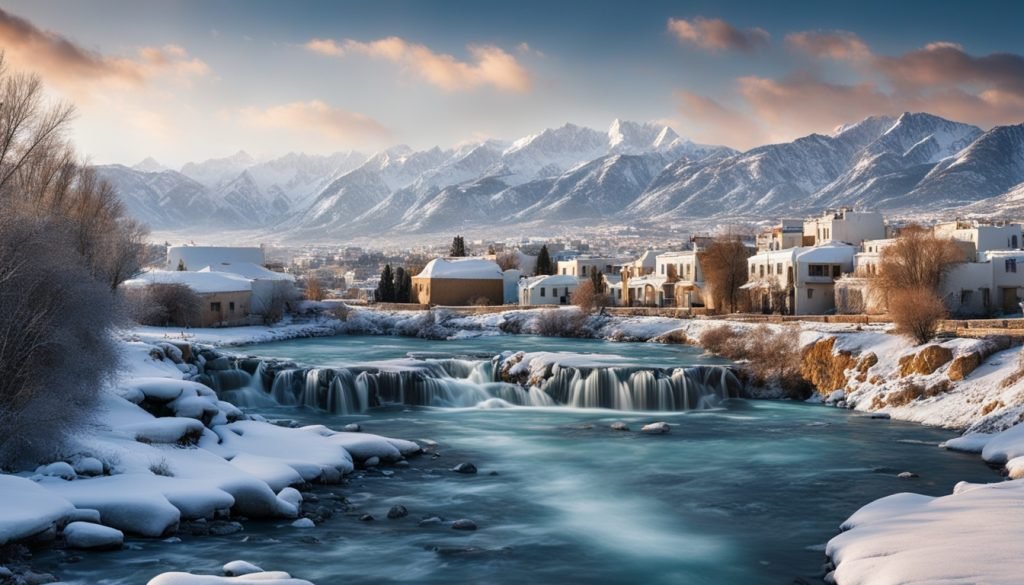
Nearby Jebel ech Chambi, Tunisia’s tallest peak, also gets snow. This adds to Thala’s cold weather. Thus, Thala’s high position and unique surroundings make it a key place for studying Tunisia’s coldest regions.
Desert Areas
Despite what many think, Tunisia’s deserts can get very cold, especially at night in winter. This shows the wide range of weather Tunisia has.
In places like Tozeur and El Borma, the weather changes drastically. They have very hot days in summer, often above 40°C. But winter nights can be almost freezing. El Borma once hit a high near 52°C, showing how extreme the desert climate can be.
These cold facts about the desert surprise many. They offer a stark contrast to the usual view of constant sunshine. By learning about these changes, one gains a fuller understanding of Tunisia’s varied climate.
What to Expect in Tunis During January
Visitors to Tunis in January will find the weather mild and welcoming. The *Tunis weather in January* has average temperatures around 12.3°C. This makes it a great time to discover the city.
Rain is moderate during this time, especially on the northern coast. Annually, Tunis gets about 485mm of rain, mostly from September to April. Yet, many days are sunny, offering a lovely climate for tourists in these cooler months.
Evenings can get cooler, so bringing a jacket or sweater is wise. This will keep you warm when out after dark. It helps make sure you’re comfortable as the temperature drops, without stopping your fun.
The sunny days and mild temperatures in *Tunis weather in January* are perfect for winter travellers. The *Tunisia winter climate data* indicates that this time provides a great balance. Visitors enjoy mild days and cool nights, making their trip to Tunisia’s capital memorable.
Conclusion
Tunisia has a varied winter climate, from mild coastal weather to cold inland and desert nights. It’s key to understand these differences for a good visit. Coastal areas like Tunis have a mild winter, with temperatures averaging 12.3°C.
In contrast, inland and southern desert areas get much colder at night, sometimes freezing. This shows how diverse Tunisia’s climate can be.
From fertile coasts to stark deserts, Tunisia’s landscape is diverse. The north and central areas enjoy a nice winter climate thanks to the Mediterranean. But, the southern deserts are much cooler at night and very hot in summer.
Visitors should pack warm clothes for evenings, especially in highlands and deserts. This will make your stay more comfortable.
Winter in Tunisia offers many experiences, from mild coastal weather to dramatic desert climates. Each area has its own charm. With plenty of sun even in winter, outdoor activities and sightseeing are great. Embracing Tunisia’s winter weather lets you enjoy its beauty and culture.

